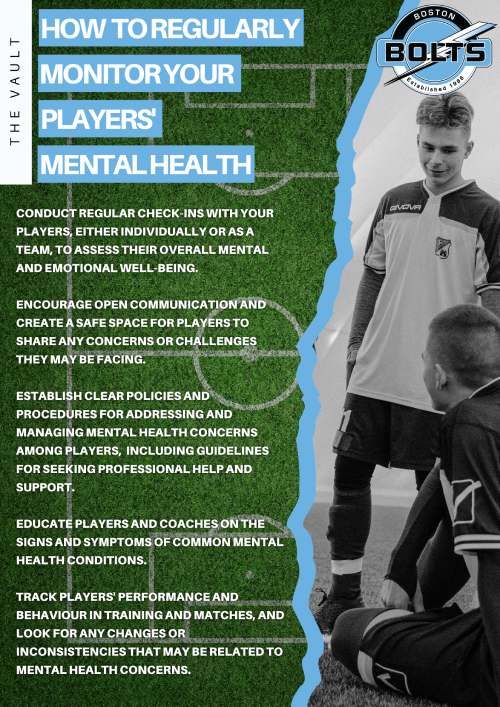
Regularly monitoring and addressing the mental health of players is vital for their overall well-being, performance, and long-term success. By doing so, coaches can help create an environment that promotes emotional resilience, improved focus, and a supportive team dynamic, ultimately contributing to the development of healthier and more successful individuals both on and off the pitch.
Here are some reasons why it is vital:
Holistic well-being: The mental health of your players is just as important as their physical health. In order to help them perform at their best, it is essential to address both aspects of their well-being. By monitoring their mental health, you can create an environment that fosters growth and development in all areas.
Early intervention: Regularly checking in on your players’ mental health allows you to identify any potential difficulties at an early stage. This gives you the opportunity to address these concerns and provide appropriate support, preventing the situation from escalating and negatively affecting their overall well-being and performance.
Stress management: The competitive nature of sports can be stressful for players, particularly at the grassroots level, where they may be striving to excel and achieve their goals. By monitoring their mental health, you can help them develop coping strategies and resilience to manage stress and prevent burnout.
Team cohesion: A positive team environment is critical to the success of any sports team. By ensuring the mental well-being of your players, you can promote team bonding, trust, and communication. This, in turn, will lead to better collaboration and improved performance on the field.
Life skills development: As a coach, you have the opportunity to influence the personal development of your players beyond their performance on the field. By monitoring their mental health, you can teach them valuable life skills such as emotional intelligence, self-awareness, and coping strategies. These skills will benefit them not only in their soccer journey but also in their personal lives and future endeavours.
Reducing stigma: By regularly addressing mental health in your coaching practice, you help to create a culture that normalises discussions around mental well-being. This can contribute to breaking down the stigma surrounding mental health conditions and encourage players to seek help and support when needed.
Injury recovery: Injuries are an unfortunate reality in sports, and they can have a significant impact on a player’s mental health. By monitoring their mental well-being, you can provide the necessary support to help them cope with the psychological challenges of injury recovery, such as feelings of isolation, frustration, and anxiety about their future in the team.
Personal growth: Mental health is a crucial component of personal growth, and by paying attention to the emotional well-being of your players, you can help them become more self-aware, empathetic, and adaptable individuals. This will not only improve their performance on the field but also contribute to their overall personal development and create a closer team unit that understands each other more.
In summary, regularly monitoring the mental health of your players as a soccer coach is essential for their holistic well-being, early intervention, stress management, team cohesion, life skills development, reducing stigma, injury recovery, and personal growth.
As a coach, you have a unique opportunity to make a lasting impact on your players’ lives by prioritising their mental well-being alongside their physical health. By promoting a supportive and inclusive team environment, you can empower your players to reach their full potential both on and off the field, while also setting a positive example for other coaches and teams in the soccer community.
This will ultimately contribute to the growth and success of the sport, while also promoting a culture that values mental health and well-being for all players.
LISTEN TO THIS ARTICLE BELOW
